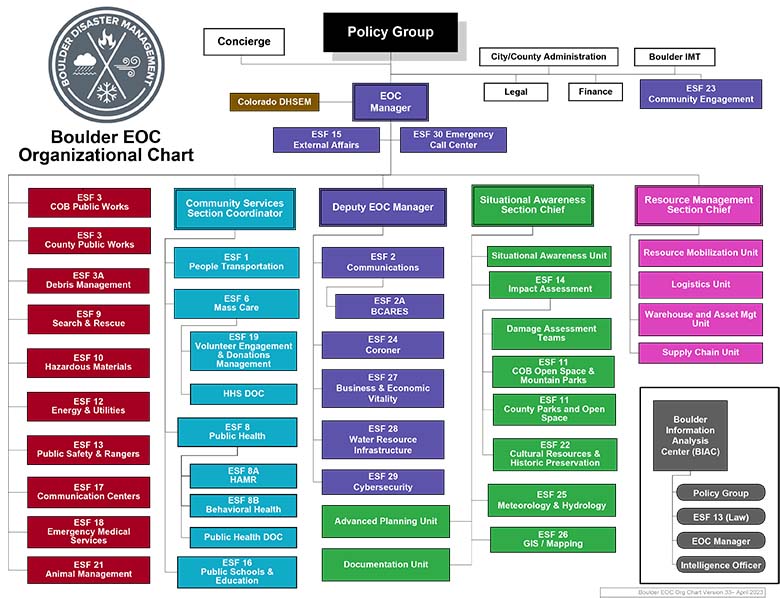What is Disaster Management?
Emergencies in our community are frequent and when they occur cause limited impacts to the number of people affected, cause minor disruptions to social structures, seldom cause infrastructure to fail and impact daily routines of a community for short periods of time. The 911 system operates to handle these emergencies daily and does an excellent job serving the communities in Boulder County.
Disasters are less frequent than emergencies but when a disaster occurs it has wide and deep impacts on the community and lasting effects for months to years. The response will be longer than the typical emergency and require response and recovery capabilities from multiple municipalities, special districts, non-profit groups and regional or state resources. The 911 system will be limited in providing all the capabilities required to manage the disaster. The establishment of the Emergency Operations Center using the disaster management system to expand capacity of capabilities, manage the multi-agency coordination system and engage State and Federal agencies are the core functions of disaster management in Boulder.
The Office of Disaster Management’s responsibility when not engaged during a disaster response is to build, deliver and maintain community disaster preparedness and resiliency programs, support hazard mitigation planning and projects to reduce the impacts of hazards, maintain disaster response capabilities through planning, training, and exercises, and initiate the disaster recovery system.
Boulder Emergency Operations Center (EOC)
The Boulder EOC is where designated management personnel assemble during emergencies and disasters to coordinate communications, provide resource mobilization and support, manage information, develop situational awareness to maintain a common operating picture, assist policy group members, support event management planning, provide operational support and coordination, and assist with continuity of government activities. In addition to large-scale emergencies and disasters, the EOC can also be activated to provide support for planned events and at the discretion of the Boulder ODM Board of Directors.
The EOC is a support and coordination center that primarily addresses consequence management issues and unmet needs. Operations and tactical planning are traditionally conducted at an Incident Command Post (ICP) or Department Operations Center (DOC) whereas the EOC supports these entities’ activities.
Multi-Agency Coordination (MAC) Group
During a disaster the Boulder Emergency Operations Center is opened which is the facility where a group of subject matter experts come together to coordinate, support and manage the disaster. This group is known collectively as our Multi-Agency Coordination (MAC) group. The MAC group is made up of representatives from numerous City of Boulder and Boulder County departments, non-profit organizations active in disaster, and the private sector. These dedicated professionals provide the foundation of the EOC.
The MAC group is organized into Emergency Support Functions (ESFs) that are divided into four main sections: Operational Coordination, Community Services, Situational Awareness, Public Information / Messaging, Resource Mobilization, and various independent specialized positions.
During a disaster each Emergency Support Function represents a specific operational capability designed to address a need or provide a service to the community. The ESF structure is part of the overall Boulder Disaster Management System that operates out of the EOC.



